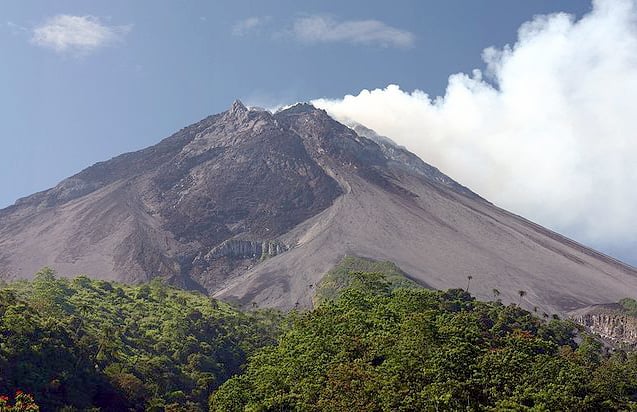At least 265,000 people live in the 20km danger zone and as of 5 November, a total of 160,000 people had been evacuated to government-run emergency shelters in Sleman, Magelang, Klaten and Boyolali districts, the government reported.
"These people are at high risk and we are still trying to force them to move to the shelters," Sutopo Purwo Nugroho, director for disaster risk reduction at the National Disaster Management Agency (BNPB), told IRIN.
"The government will use force if necessary to protect the safety of the people," he said, noting some residents had ignored earlier government warnings and died.
Since 26 October, 104 people have lost their lives after Merapi erupted several times, the BNPB said.
The latest eruption, the strongest yet, started just after midnight, killing 60 people and seriously injuring another 200, mostly burned by clouds of hot gas and volcanic debris, the agency reported.
No figure was available for the number of emergency posts after the government expanded the exclusion zone from 10km to 20km. Initially there were 16 evacuation centres in the four districts.
"Some shelters have recently been moved farther way from the danger zones so we are still trying to rearrange things," Nugroho said.
About 27,000 people were staying in the new football stadium in Yogyakarta.
"Logistics are adequate but they need more sanitary facilities such as toilets, water and hygiene kits," he said.
Meanwhile, President Susilo Bambang Yudhoyono said he was ordering the BNPB to take over the Merapi emergency response from the governments of Yogyakarta and Central Java provinces.
He also said the Indonesian Armed Forces would deploy health, engineering, infantry, marine and logistics brigades to help evacuate people, as well as build field hospitals, emergency shelters and public kitchens.
"It appears that the eruption will continue and it cannot be predicted when the hot clouds and lava flows will stop," he said.
"Because of that, I have decided to take these extraordinary measures as part of the emergency response," Yudhoyono said in a televised press conference at the Presidential Palace.
Yudhoyono said the government would compensate for livestock left behind by residents fleeing to emergency shelters, given reports that some villagers had returned to their homes fearing for the safety of their cattle and crops, risking their lives in the process.
"The government will buy the livestock for decent prices. We don't want people who have been hit by a disaster to be burdened by concerns about having to endure further losses," he said.
atp/ds/mw
This article was produced by IRIN News while it was part of the United Nations Office for the Coordination of Humanitarian Affairs. Please send queries on copyright or liability to the UN. For more information: https://shop.un.org/rights-permissions

![What's Unsaid podcast teaser picture with a portrait photo in black and white of Jean Marie Ishimwe, East African Regional Lead, Refugees Seeking Equal Access to the Table [R-SEAT], over a radial gradient background. The colour at the centre is a purplish blue and the colour outside is green. On the top we see the title of the podcast: What’s Unsaid.](https://assets.thenewhumanitarian.org/s3fs-public/styles/media_list_fallback_/public/2024-05/landscape-whats-unsaid-jean-marie-ishimwe.jpg?itok=Bz4wanCN)



